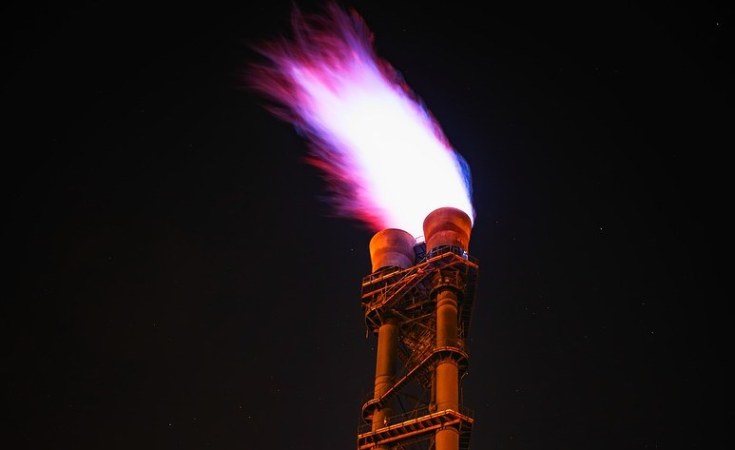"We'd probably very early in the year close out another segment of the market, an off-take for South Africa," David Ige, the CEO of the Lagos-based energy firm, said.
Nigeria will kick off the delivery of gas to South Africa for the first in the history of trade relations between the two nations if talks between Riverside LNG and counterparts in Africa's most industrialised nation succeed.
"We'd probably very early in the year close out another segment of the market, an off-take for South Africa," Bloomberg quoted David Ige, the CEO of the Lagos-based energy firm, as saying in an interview.
"There's a massively evolving gas market in the region, anything around 3,000 nautical miles of Nigeria. So that covers southern Africa, western Africa, all to northwest Europe and to the Caribbean and South America broadly."
In November, Riverside LNG signed a pact with Johannes Scheutze Energy Import AG in Germany regarding renewable energy and a gas export deal worth $500 million.
Nigeria is in a drive to rev up foreign interest in its oil and gas industry, constrained for years by multiple issues from crude theft and pipeline vandalism to ageing infrastructure and structural bottlenecks, all of which account for why international oil companies exit in droves.
New measures and incentives to court investors and reduce barriers to entry to improve the cost of doing business are among the government's top agenda to drive production and boost revenue.
That involves a recent inclusion of signature bonuses, the fees it takes from new investors after signing contracts, in the lump sum that oil & gas companies pay on production.
South Africa needs to build a plant first to enable it to take liquefied natural gas from Riverside LNG, implying that supply will only begin in 2027. That means there's "enough time for import terminal infrastructure," the Riverside LNG CEO said.
The initiative could help South Africa in tackling a sticky electricity problem.
The country is in the middle of a profound power crisis as Eskom, the state-owned electric utility, reels from the strain of old infrastructure, forcing the company to resort to load-shedding that often triggers blackouts across the country in a big blow to economic activities.
An estimate shows that corrupt practices at Eskom cost South Africa $55 million every month.
Decade of gas
Nigeria wants gas to play a much bigger role than before in its energy mix and exports as it progresses through its energy transition, having declared the ten years to 2030 as "the decade of gas."
At 209.5 trillion cubic feet (tcf), Nigeria holds the largest proven natural gas reserves on the continent, accounting for one-third of Africa's total of 620 tcf, according to industry watchdog Nigerian Upstream Petroleum Regulatory Commission.
This month, NNPC Limited, UTM Offshore and Delta State inked a deal to develop the first floating LNG project in the country at an investment cost of $5 billion, with the vessel planned to handle 1.8 billion metric tons per year for the international market. Wison Heavy Industry, based in China, will build the facility.
NNPC Prime LNG Limited, a unit of the state-owned energy company, has also struck a supply installation and commissioning deal with SDP Services Limited at COP 28 in Dubai for an LNG project targeting production of 421 tonnes per day towards boosting domestic consumption.
But the government has had to grapple with various drawbacks in gas production, some of them capable of triggering environmental hazards
"What is causing this gap (is) majorly theft on our pipelines. Some people get it, thinking it's an oil line or a condensate line, unknown to them that it is a gas line," Nigeria LNG's general manager, production, Nnamdi Anowi, said in October, referring to vandals mistaking gas pipelines for those carrying crude and condensate.
"When they puncture it, we have to deal with this kind of issue. And this is a big risk," the official said.
Nigerian LNG is a joint venture including Nigeria, Shell, TotalEnergies, Eni and Electricite Holdings.
The company, which has reached 50 per cent completion in its Train 7 Project, counts limited gas supply from upstream companies as its biggest headache, its trains 1 to 7 only operating at half capacity.
The Train 7 Project, at delivery, will ramp up production capacity from 22 million metric tonnes per annum (mtpa) to 30 million mtpa and place Nigeria among the top gas-producing countries.
There are also concerns around the volume and impact of flared gas by companies on host communities, which has cost the country dear over the years.
In the 10 years to 2022, Nigeria flared 80 billion standard cubic metres of gas, equivalent to N9 trillion in lost revenues, causing health and environmental hazards to host communities.
The government has set up the Nigerian Gas Flare Commercialisation Programme to address the issues, raking in just N346 billion in penalties in the past five years.


